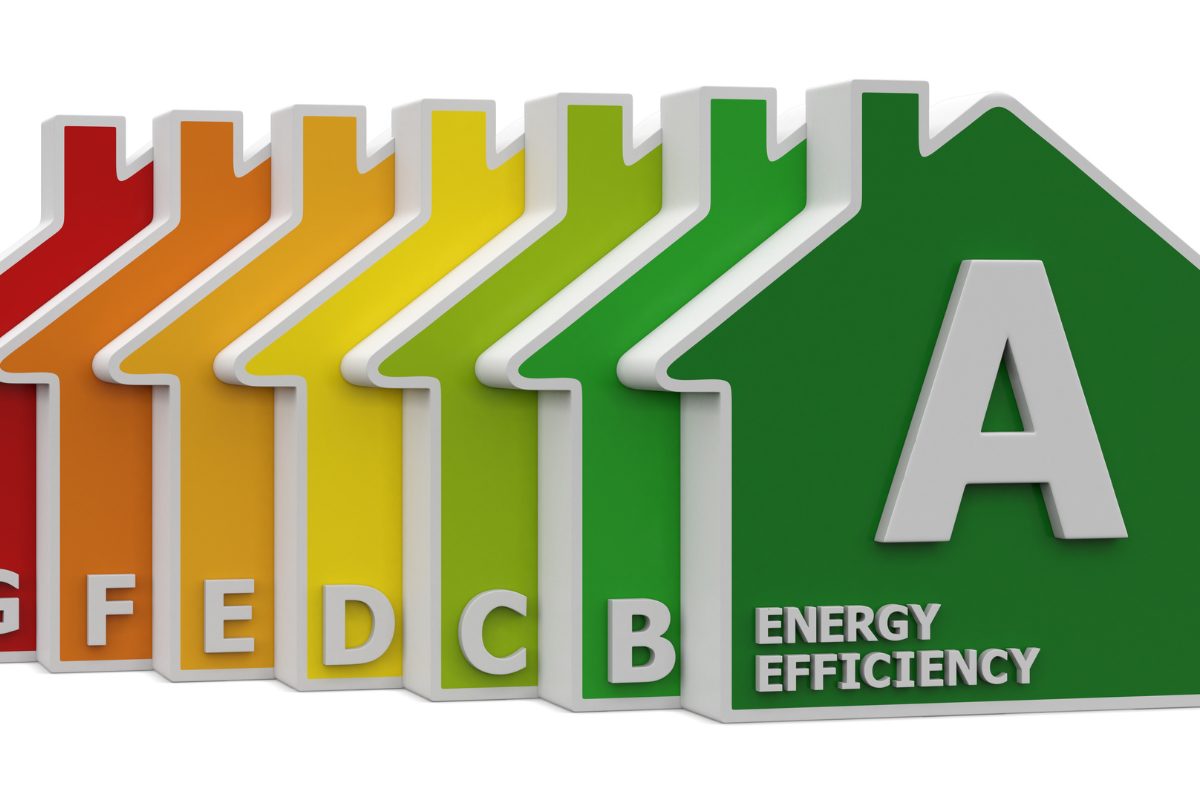EPC Manchester
Energy Performance Certificates in Manchester and the surrounding areas
What Is An EPC?
An Energy Performance Certificate, commonly referred to as an EPC, offers an in-depth evaluation of a property’s energy efficiency. This is essential for both sellers and buyers, as it provides insights into a home’s energy use and the cost of running it. The certificate is particularly useful for modern homes and older properties alike, shedding light on areas where energy efficiency can be improved. Possessing an EPC equips you with valuable information, allowing you to make more sustainable choices, whether you’re selling, buying, or leasing a property.
What's Included In An EPC?
The Energy Performance Certificate offers a complete visual inspection of the property’s energy-related features. This involves a close look at key aspects like heating systems, insulation, and even renewable energy sources. More than just outlining the existing status, the EPC offers expert advice on improving energy efficiency and reducing costs. Recommendations, along with estimated costs for implementing them, are consolidated in an easily readable report that utilises a colour-coded rating system for quick comprehension.
- Understand the overall energy efficiency of the property and how it compares to others in the area
- Receive specific recommendations for improving energy efficiency and estimated costs for these upgrades
- Insight into the property's carbon dioxide emissions helps you assess its environmental impact
What You’ll Learn From Your EPC
The accredited energy assessor brings extensive knowledge of energy efficiency measures and local building norms. Their careful assessment will enable you to understand the energy efficiency of the property you’re considering, empowering you with the information needed to make informed decisions.
During the assessment, the energy assessor will review key features such as heating systems, insulation quality, window types, and any renewable energy installations to identify potential areas for improvement.
- Energy Efficiency Rating A-G – Where ‘A’ indicates high energy efficiency and ‘G’ shows low efficiency
- Recommendations – Suggested measures to improve the property’s energy efficiency
- Estimated Costs – Anticipated expenses for implementing suggested improvements
Domestic EPC
What is a Domestic EPC?
A Domestic Energy Performance Certificate (EPC) is a legal document that provides an energy-efficiency rating for a residential property. From Victorian terraced houses to modern flats, an EPC equips homeowners, buyers, and tenants with crucial insights into the property’s energy use and costs.
Importance of a Domestic EPC
Having a Domestic EPC is not just a legal requirement for selling or renting a property; it also provides a roadmap for making energy-saving improvements. Common improvements include upgrading insulation, installing energy-efficient boilers, and utilising LED lighting.
What’s Included?
- Insulation Assessment: Inspect the quality of wall and loft insulation.
- Heating System Review: Examine boilers, radiators, and thermostats for energy efficiency.
- Energy Costs: The EPC report gives an estimated annual energy cost and potential savings.
Benefits
- Cost Savings: Reduce your utility bills through targeted improvements.
- Increased Property Value: Energy-efficient homes often command higher market prices.
- Environmental Impact: Lower your carbon footprint by making your home more energy-efficient.
FAQ: Domestic EPC
A Domestic Energy Performance Certificate (EPC) is a legal document that provides information about a property’s energy efficiency. It is required by law whenever a residential property is sold, let, or built in the UK. The EPC gives prospective buyers or tenants an insight into the energy costs and environmental impact of living in the property, thereby aiding in making an informed decision.
While both Domestic and Commercial EPCs serve the same purpose—evaluating the energy performance of a building—they differ in their scope. A Commercial EPC assesses energy usage in commercial properties and can be more complex due to the variety of uses a commercial building can have. On the other hand, a Domestic EPC is generally more straightforward and focuses solely on residential properties.
A Domestic EPC examines various aspects of a property to gauge its energy efficiency, including the type and age of the property, insulation, heating systems, and any renewable energy installations. The evaluation results in an energy efficiency rating on a scale from A (most efficient) to G (least efficient), which is depicted on the certificate.
A Domestic EPC is valid for 10 years from the date of issue. However, if significant changes are made to the property’s energy efficiency measures, it may be beneficial to get a new EPC even before the expiry of the current one.
To produce a Domestic EPC, the surveyor should be accredited with a recognised body and should have undergone training specific to energy assessments. They should also adhere to the guidelines set out by governing bodies and be able to offer professional advice on improving a property’s energy efficiency.
Commercial EPC
What is a Commercial EPC?
A Commercial Energy Performance Certificate (EPC) is an obligatory document for business properties being sold, rented, or built in the UK. This certificate gives an energy rating from A to G and is valid for up to 10 years.
Importance of a Commercial EPC
The EPC is essential for business owners and potential buyers or tenants for compliance with regulations. Moreover, it provides actionable insights into reducing energy costs in large commercial spaces, affecting the bottom line.
What’s Included?
- Lighting Assessment: Evaluation of the energy efficiency of the lighting systems in different zones of the property.
- HVAC Examination: Detailed scrutiny of Heating, Ventilation, and Air Conditioning systems.
- Operational Ratings: These are ratings based on actual energy usage, vital for businesses to understand their energy consumption patterns.
Benefits
- Operational Savings: Businesses can save significantly on operational costs by implementing energy-saving measures.
- Regulatory Compliance: Having an up-to-date EPC ensures you are compliant with UK regulations, avoiding potential fines.
- Green Credentials: An energy-efficient building strengthens a company’s CSR (Corporate Social Responsibility) profile.
FAQ: Commercial EPC
A Commercial Energy Performance Certificate (EPC) is a legal requirement for non-residential properties in the UK that are being sold, rented, or newly constructed. The certificate assesses the building’s energy performance and recommends ways to improve its efficiency. It is crucial for compliance and gives prospective buyers or tenants an idea of the building’s energy costs and environmental impact.
While both types of EPCs aim to evaluate the energy efficiency of a building, a Commercial EPC is more complex. It deals with a variety of building uses, from office spaces and warehouses to retail outlets. Each use-case can have different energy needs and efficiencies, making the assessment process more intricate than that for Domestic EPCs.
A Commercial EPC assesses factors such as the building’s structure, heating and cooling systems, lighting, and insulation. The evaluation also considers any renewable energy systems in place. The result is an energy rating that ranges from A (most efficient) to G (least efficient), which is documented in the certificate.
A Commercial EPC is valid for 10 years from the date of issue. If there are substantial changes made to the building’s energy systems, it’s advisable to get a new EPC to reflect these changes.
To produce a Commercial EPC, a surveyor should be accredited by a recognised body and specifically trained in commercial energy assessments. The surveyor should also be up-to-date with any changes in legislation or best practices in the field of energy efficiency.
Our Services
Click on the image for more information

RICS Home Survey
Level 2
Choose the RICS Level 2 Home Survey for modern properties that are in reasonable condition to gain a thorough yet accessible review of the property's condition. Identify minor to moderate issues, so you can negotiate price or plan for future repairs.

RICS Home Survey
Level 3
The RICS Level 3 Home Survey is the most comprehensive inspection available, suitable for older properties and ones that have been significantly extended. Delve deep into structural integrity and potential defects to make an informed decision and safeguard your investment.

RICS Valuation
Reports
Need an accurate and reliable market value for your property? Obtain an in-depth RICS Valuation Report, meticulously conducted by certified valuation professionals. Ideal for a range of purposes including Help to Buy, Shared Ownership, Probate, Matrimonial, Capital Gains Tax, and more.

Energy Performance
Certificates
Secure an Energy Performance Certificate (EPC) with our accredited specialists, essential for marketing, leasing, or selling your property. Our EPCs provide critical information about your property's energy efficiency, aiding compliance with regulations and enhancing its appeal to prospective buyers or tenants.
Why Choose Us
Local
Expert surveyors with superb local knowledge.
Prompt
Efficient service and prompt report delivery.
Quality
Outstanding, consistently 5-star rated service.
Affordable
Top-quality, affordable pricing for assessments.
Client Testimonials











